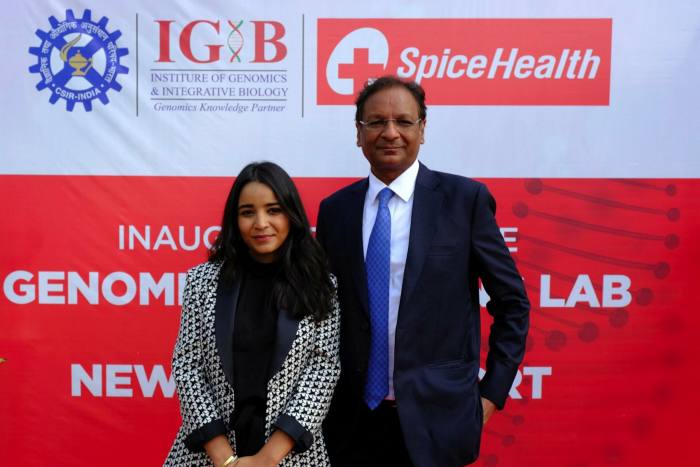Indian airline boss prospers in pandemic by pivoting to healthcare
Indian airline tycoon Ajay Singh had little experience in healthcare but last November, as the country was being pummelled by coronavirus, he suddenly branched out into Covid-19 testing and later genomic sequencing.
Known for his close connections with Narendra Modi, India’s prime minister — he is credited with coining the 2014 election slogan “This time, Modi’s government” — Singh launched SpiceHealth, vowing to make tests cheaper, faster and more available.
Within months, the group had extended its reach across the country, even providing the testing in April for some of the millions of pilgrims who joined the annual Kumbh Mela, the country’s biggest religious gathering that was later seen as a superspreader event.
Singh’s rapid pivot from the lossmaking airline sector into healthcare underscores how some of India’s biggest tycoons have managed to prosper, even during the pandemic.
India is one of the countries worst hit by Covid-19, with more than 28m cases and 335,000 dead, many of them occurring in its catastrophic second wave this year.
Even before the latest outbreak, SpiceJet, in which Singh has a 60 per cent stake, was reeling from a national lockdown last year. The airline reported losses in the past four quarters and has deferred the salaries of some staff for weeks.
In February, its auditors Walker Chandiok & Co said there was “material uncertainty” over SpiceJet’s ability to continue as a going concern. Its losses would have been even wider had it not included expected compensation from Boeing for the grounding of 737 Max aircraft.
“We can’t understand how they are staying alive,” said an executive at a rival airline.
Jitender Bhargava, former executive director of Air India, praised Singh for his management of SpiceJet, rescuing it seven years ago when it was nearly bankrupt and moving quickly to snap up the aircraft of rival Jet Airways after it collapsed in 2019.
“He has done well, but as far as the finances are concerned, few airlines have cash reserves. How long can one sustain with the second wave we’ve had?” said Bhargava.
But industry executives and analysts say that Singh is an opportunist who is likely to get through the turbulence.
“Indian aviation is drowning but Ajay will survive,” said Neelam Mathews, an aviation analyst in New Delhi.
Tushar Srivastava, head of communications for SpiceJet and SpiceHealth, said “no favours were sought or provided” by the government to the group’s businesses.
SpiceJet, under Singh’s control and management, settled all the debts necessary to revive the airline in 2014 and there was no financial assistance or waivers provided by the government.
335,000
The number of Covid-19 deaths in India
Singh does not come from one of India’s established business families, such as the Tatas, whose group spans sectors from steel to software, or the Ambanis, the dynasty behind Reliance Industries, which dominates petrochemicals and retail.
Observers view Singh, who did his masters in business administration at Cornell University, as a technocrat who has managed to straddle the worlds of business and politics.
“A person who can talk to both sides of the aisle, the political and the money, is a rare animal,” said Rohit Chandra, assistant professor of public policy at the Indian Institute of Technology Delhi.
Singh served as a close aide to Pramod Mahajan, the former telecoms minister and fundraiser for the ruling Bharatiya Janata Party, who was murdered by his brother in 2006.
So close is he to the ruling party that BJP leaders often appear at Singh’s events. Modi inaugurated the launch of SpiceJet’s seaplane service in October. A month later, Amit Shah, India’s home affairs minister and one of Modi’s closest lieutenants, appeared at the opening of SpiceHealth’s first mobile testing lab, a public-private partnership with the country’s top clinical research body.
Whatever his connections, Singh’s timing on the switch to healthcare has proved fortuitous, coming before this year’s outbreak brought air travel to a near halt for a second time.
Run by his 24-year-old daughter Avani Singh, SpiceHealth, a separate company from SpiceJet, operates 15 mobile laboratories across the country that each have a daily capacity of 3,000 tests. SpiceHealth has set up a genomic sequencing facility in Delhi’s international airport and Avani has spoken about moving into vaccine procurement and distribution.
SpiceHealth was launched using Singh’s personal money. The company started with rapid tests then branched into other products, including sales of “SpiceOxy”, a ventilation device.
The Spice group of companies transported 34m Covid-19 vaccines across the country between January and April. During the second wave, they airlifted thousands of oxygen concentrators from Beijing, Nanjing, Wuhan and Hong Kong to India to relieve a shortage of the gas.

Not content with his healthcare foray and apparently unfazed by SpiceJet’s problems, Singh has indicated his willingness to strengthen his commitment to India’s battered airline industry.
In March, he was shortlisted as a bidder for Air India, the state-owned monolith that New Delhi has been trying to privatise for years. If he succeeds, a buyer is set to be announced later this year, Singh will have to take on an eye-watering $3.3bn of debt.
“You’ve got to give it to Ajay Singh, something that can’t be denied to him is that he’s a guy that seizes opportunities,” said Bhargava.
For all the latest Business News Click Here
For the latest news and updates, follow us on Google News.
